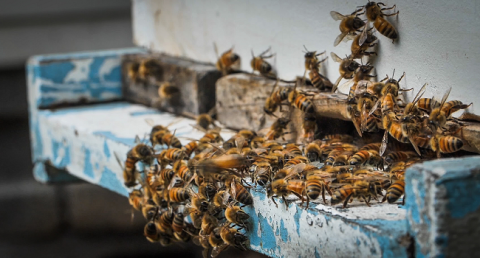Honey Bees

The People's Garden Apiary, installed in 2010, is located on the roof of the Jamie L. Whitten Building and has homed up to approximately 80,000 Italian honey bees.
USDA's Agricultural Research Service (ARS) Bee Research Lab in Beltsville, Maryland, helps keep these colonies of bees strong and healthy so they can pollinate crops growing in the People's Garden and neighboring landscapes. They also produce delicious honey!
Beehives are often important elements of urban gardens due to the pollination services they provide. They’re also big business. Honeybees pollinate $15 billion worth of crops in the United States each year, including more than 130 types of fruits, nuts, and vegetables. Honeybees also produce honey, worth about $3.2 million in 2017 according to USDA-National Agricultural Statistics Service (NASS).
How are hives constructed?
The beehives are wooden box-like sections stacked on top of each other. Each box (or super) holds 8-10 wooden frames which include a thin sheet of wax foundation in each frame. The bees build their combs on these foundations.
How is honey extracted?
Honey is stored in the combs in the upper parts of the hive. When the bees have filled the combs in the upper section with honey and covered them with wax caps, the beekeeper takes them away to extract the honey.
Are honey bees native to the United States?
Honey bees are not native to the United States. The scientific name for honey bee is Apis mellifera. Since humans first began keeping honey bees, their principal aim has been the harvest of honey. Beekeepers select the appropriate type of honey bee based on temperament, physical characteristics, disease resistance, and productivity.
Italian honey bees were selected for the People's Garden Apiary because they are most often used in commercial beekeeping in the United States. These bees have a relatively gentle disposition and are good honey producers. They are not the most resistant to disease, but they excel in most other areas.
There have been some queen survivorship issues in both of the People's Garden colonies, which actually mirrors what's going on in the rest of the country. Queen health is an issue for everyone who buys queens, commercial or hobbyist. The exact underlying reasons for poor queen survivorship is unknown, but the ARS lab is actively researching this problem.


